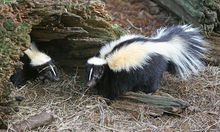The Colorado Department of Agriculture is encouraging livestock and pet owners to discuss animal health concerns, including the rabies vaccine, with their local veterinarian after two Weld County horses tested positive for rabies infection.

Striped skunks - Typical wild life carriers of rabies
Horses frequently come in contact with skunks, foxes, bats, and other animals that may have rabies and can be infected by a bite from a rabid animal.
© 2013 by Tom Friedel
“The department would like to stress two very important points,” said State Veterinarian, Dr. Keith Roehr. “One—animal owners need to be aware that rabies is transferring from one species to another and they should monitor their animals for symptoms; and two—local veterinarians are a valuable resource to help producers decide the best course of action to protect their livestock and pets from rabies.”
Rabies is a viral disease infecting the brain and central nervous system. The clinical appearance of rabies typically falls into two types: “aggressive” and “dumb.” Aggressive rabies symptoms include combativeness and violent behavior and sensitivity to touch and other kinds of stimulation.
There is also a “dumb” form of the disease in which the animal is lethargic, weak in one or more limbs, and unable to raise its head or make sounds because its throat and neck muscles are paralyzed.
Horses frequently come in contact with skunks, foxes, bats, and other animals that may have rabies and can be infected by a bite from a rabid animal. Often, these bites, which are usually on the muzzle or lower legs, go unnoticed.
The two Weld horses were on separate properties and their cases are unrelated, according to the Colorado Department of Agriculture. The first case was detected in Logan County in April.
All three animals were euthanized after showing severe clinical signs of the disease, according to the Colorado Department of Agriculture.
Rabies infects the brain and central nervous system and can be passed to humans from animals, primarily through the bite of an infected animal.
There is no cure once symptoms appear, although there is a vaccine to prevent infection. The state agriculture department is encouraging livestock and pet owners to discuss vaccination of their animals with their local veterinarians.
Learn more about Rabies in Horses
